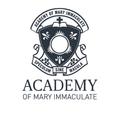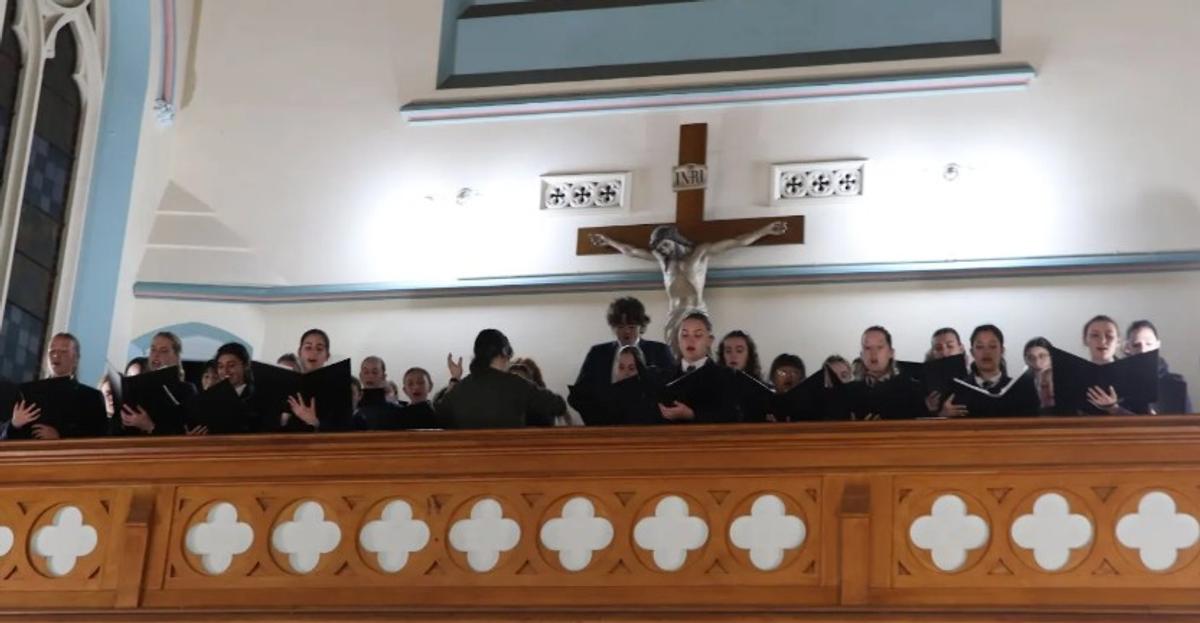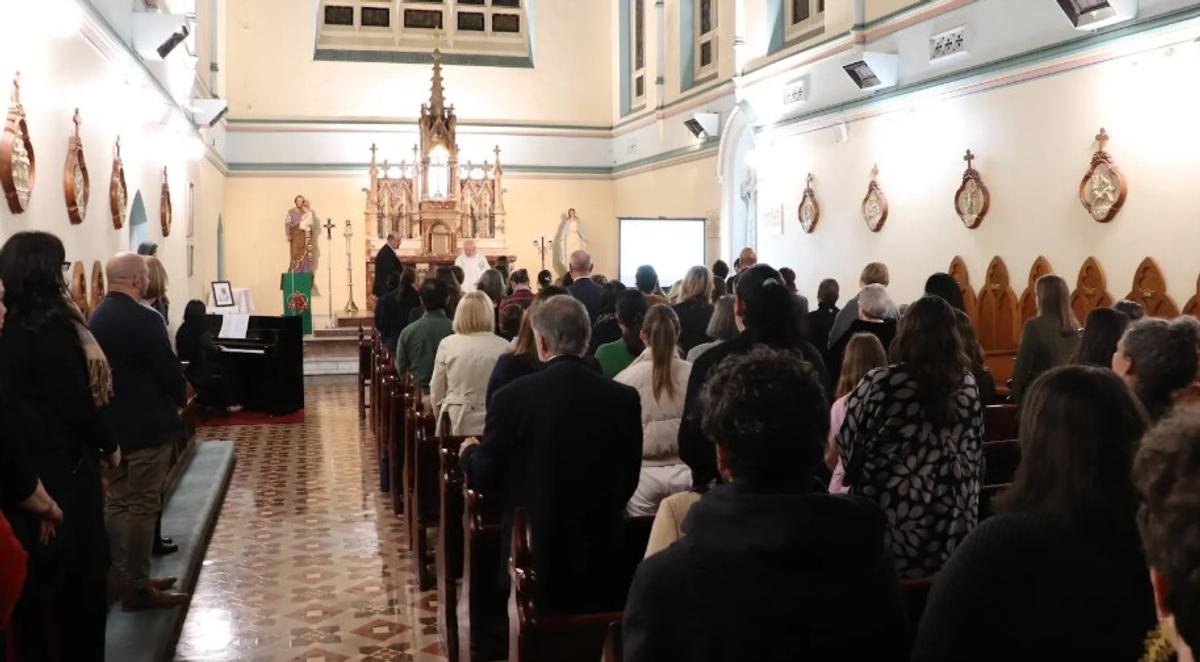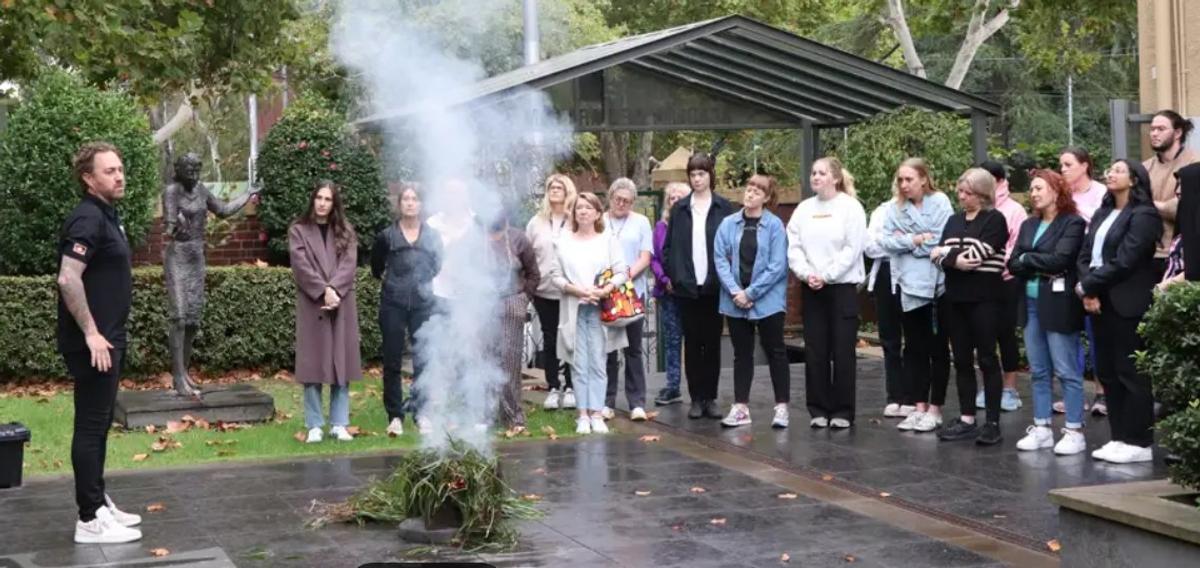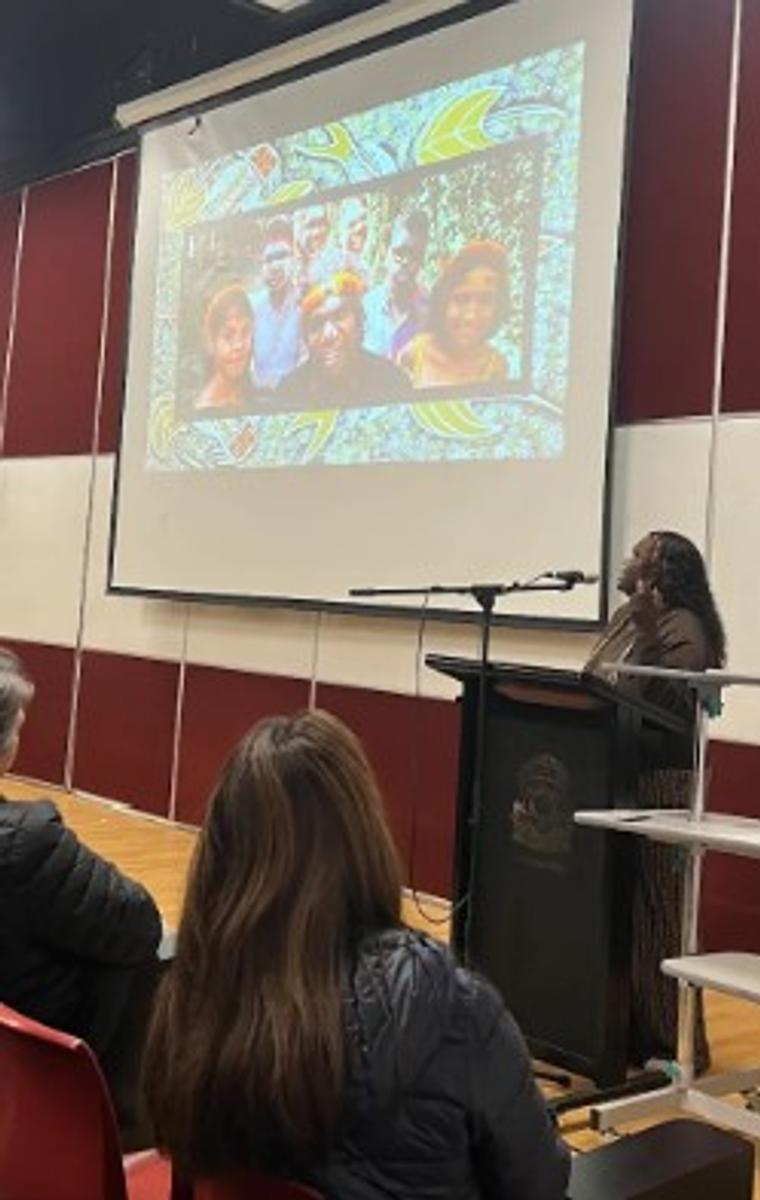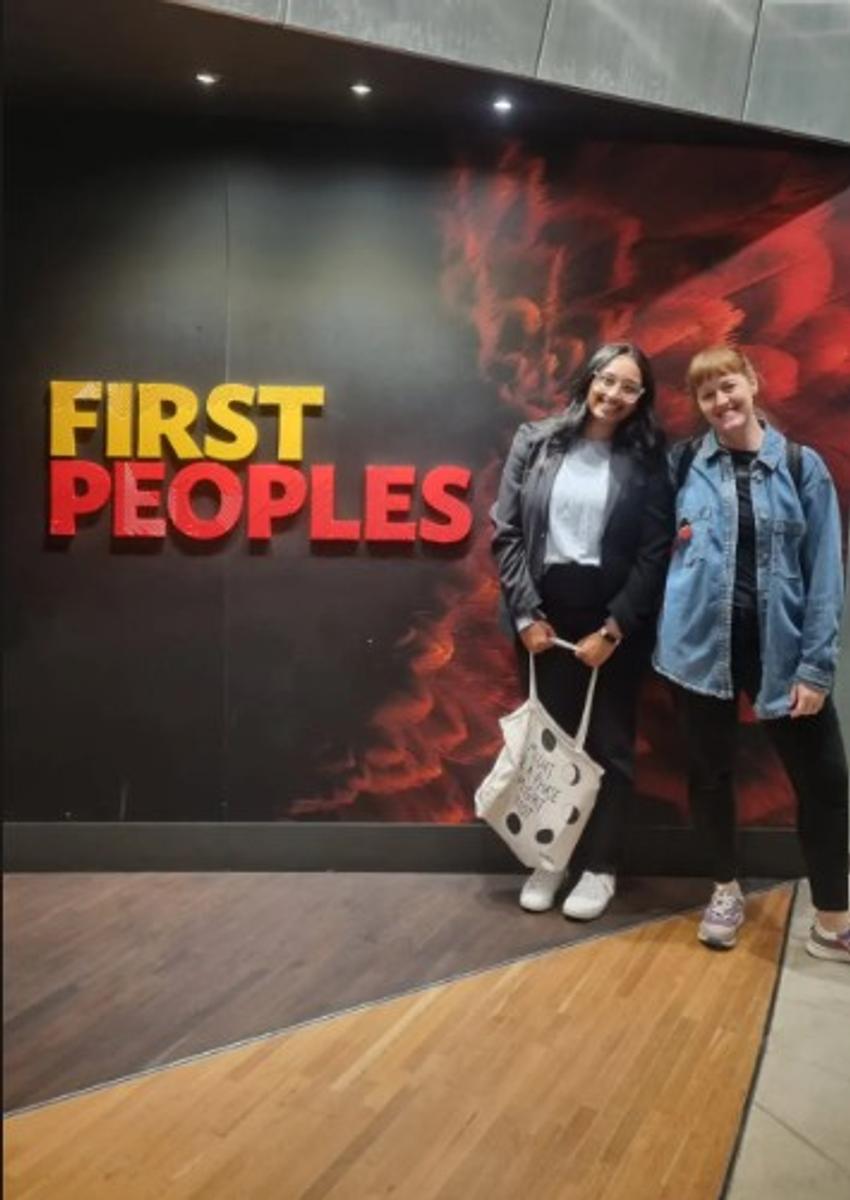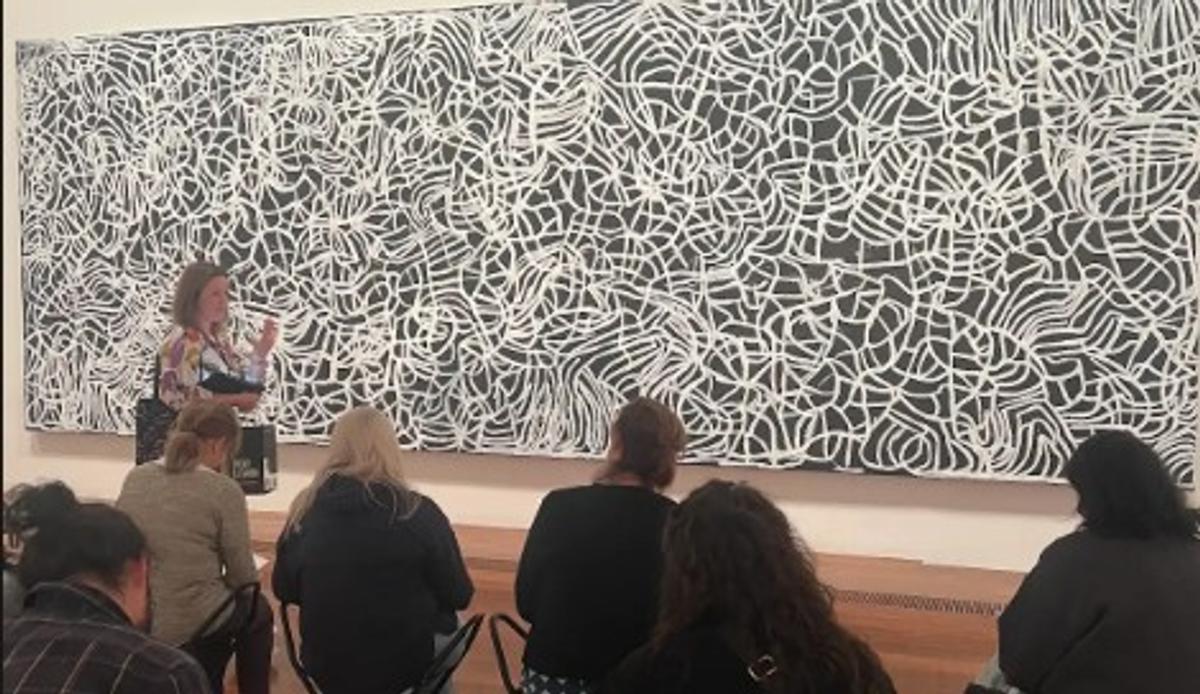Faith & Mission
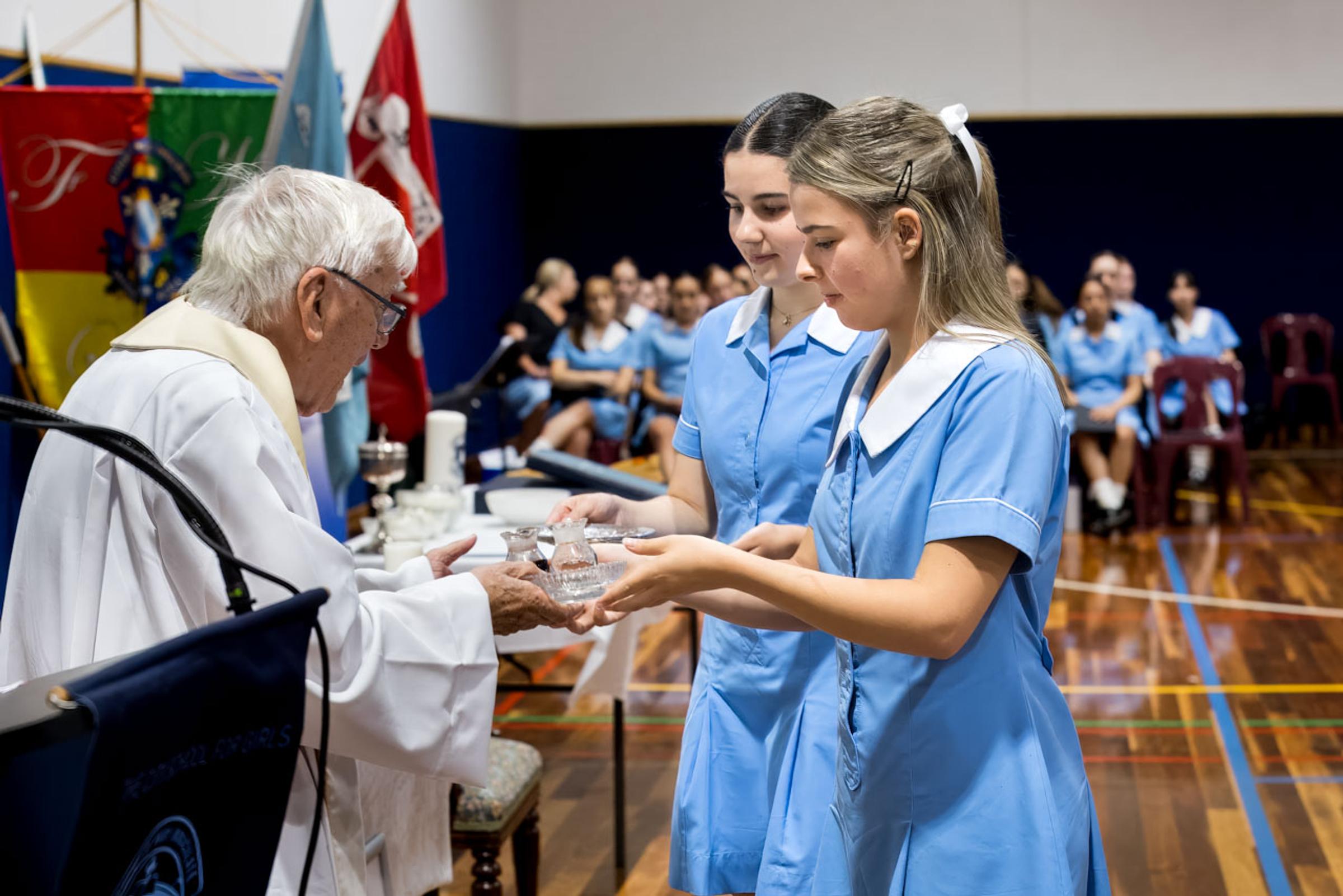
A Celebration of Love and Gratitude
On Thursday evening, our College community gathered in the Chapel for a beautiful and heartfelt Mothers' Day Mass, honouring the incredible mothers, grandmothers and mother-figures in our lives. It was a special opportunity to come together in prayer and gratitude, reflecting on the love, strength, and care that mothers so generously give.
The Mass was made particularly meaningful by the involvement of our students and their mothers, who led the readings and prayers with reverence and confidence. Their participation reminded us of the powerful connection between faith and family, and the important role mothers play in nurturing both.
We extend our sincere thanks to all the parents and families who joined us for this special occasion. Your presence added to the warmth and spirit of the evening.
A special thank you also goes to our College choir, whose beautiful singing lifted our hearts and filled the chapel with a sense of peace and joy. Their music was a moving tribute to the women we celebrated.
The Election of Pope Leo XIV
Let’s not beat around the bush, Pope Leo XIV is set to be an exceptional Pontiff for this new era in the Catholic Church. In his opening address he proclaimed “peace be with you” to the gathered crowds. As they say about the synoptic gospels, the first line always sets the tone for the rest of the story.
The elevation of Pope Leo, an American with socially progressive values much like Pope Francis, signals that the Vatican is not backing away from its current direction. In fact, it’s doubling down, this is no one-off, Pope Francis was not an anomaly. Twice now, the Church has made it clear that it envisions a socially engaged Catholicism. One that remains rooted in traditional doctrine but speaks boldly to contemporary issues of justice, compassion and human dignity.
Before his election, Pope Leo spent significant time working with impoverished and marginalised communities in Peru, where he advocated for the rights of Indigenous peoples, migrants and workers. His deep commitment to social justice on the ground speaks volumes about the values he brings to the papacy. Pope Leo can speak five languages fluently and read a further two - he is ready to bridge the divide in our global community, even when others may not be. His election, at a time when the American Catholic Church is grappling with internal divisions and diminishing influence, is a bold move, it sends a clear message, the Vatican will not allow Christian identity to be hijacked by empty slogans wrapped in red, white and blue - what the world needs are true biblical values, and, through Pope Leo, the Church is offering a clear vision, one rooted in humility, justice and mercy.
Pope Leo stated to the world that we must move forward, “without fear, together, hand in hand with God and with one another.” It is a powerful and hopeful stance at a time when peace and courage are desperately needed. Through these words, Pope Leo XIV positions himself as a servant-leader committed to dialogue, encounter and unity in a divided world. May we all pray that his opening word to us becomes a reality.
PAPAL CONCLAVE - How do they Work?
A papal conclave is the gathering of the College of Cardinals to elect a new pope when the position becomes vacant. Held in the Sistine Chapel in Vatican City, the conclave is steeped in tradition and prayer. Cardinals are secluded from the outside world as they discern who among them is called to lead the Catholic Church. The decision is made through a secret ballot, and once a two-thirds majority is reached, white smoke rises from the chapel chimney, signalling to the world that a new pope has been chosen.
Take a look at the slideshow below to see how it all ran this year.
Walking the Line of Country & Christianity
On our recent Staff Spirituality Day, the Academy community came together to explore the deep and sacred intersection of Indigenous spirituality and Christianity. Under the theme "Walking the Line of Country & Christianity", the day offered staff time to reflect, learn and grow in faith and cultural understanding.
We began with a liturgy led by Sr Mary, honouring Pope Francis’ call to care for all creation. A powerful Smoking Ceremony and Welcome to Country then grounded us in a deep respect for the land on which we work and learn.
Our guest for the day, Leila Gurruwiwi, shared moving insights into Yolŋu life and culture through the film Luku Ngärra: The Law of the Land, followed by a rich Yarn Circle for reflection. Leila’s wisdom invited us into deeper listening and challenged us to consider how we integrate Indigenous perspectives into our spiritual and professional lives.
The afternoon allowed staff to engage in a range of chosen activities, First Nations' Art at the NGV, Yarra River Walk, Bunjilaka Aboriginal Cultural Centre at Melbourne Museum or a walk of the Black Mile in Fitzroy, each one designed to support stillness, creativity and connection.
We are grateful for the opportunity to learn from Indigenous voices and reflect on how we live out our Mercy values in respectful and inclusive ways.
Gospel Breakdown - John 10: 27 - 30
Text: What does it say? My sheep listen to my voice; I know them, and they follow me. I give them eternal life, and they shall never perish; no one will snatch them out of my hand. My Father, who has given them to me, is greater than all; no one can snatch them out of my Father’s hand. I and the Father are one.”
Message: What is Jesus’ message? Jesus pointed out that sheep only recognize the voice of their own shepherd; those who don't listen to the witness of Jesus are proving they're not part of His "flock". Jesus makes this statement under dire circumstances. His critics have trapped Him in a corner of the temple, daring Him to repeat His claims, and apparently prepared for violence. In typical fashion, Jesus not only responds with brave truth, but He also continues, culminating in a statement that seems almost deliberately intended to enrage His critics.
- Response & Image: What is being asked of us? We’re not going to learn to hear His voice immediately, but we anchor ourselves into the herd He put us in, the herd of faith. We learn together.
Ms Hannah Hale
Director of Faith & Mission
Reflection
This reflection is motivated by the recent death and funeral ceremony of Pope Francis.
Unsurprisingly, none of the multitudes of newspaper and magazine articles written about the life of Pope Francis mentioned that he worked at the Academy.
Many in our College community will recall the work Pope Francis did in greeting all who entered by the College Reception.
It is true that I am referring to the life size cardboard cut out of the Pope that stood by the Reception desk for quite a number of years. But, the Pope’s work of welcome to all was genuine.
Photographs with the Pope were common amongst staff, students and parents. The Pope would regularly feature in Mercy Day videos. Always respectful and always much loved.
More significantly, the way that Pope Francis ‘worked’ with our College community was through the relevance of his leadership and his teaching.
Through the years in which I helped to prepare daily prayers for our Mentor Group classes, or prepare College liturgies or Reflection days, the teaching of Pope Francis proved to be a wonderful resource.
The encyclical ‘Laudato Si’ is an obvious example of a teaching of Pope Francis that resonated with relevance and purpose for our students, parents and staff. In the encyclical, Pope Francis acknowledged the severity of environmental degradation, including climate change, pollution and biodiversity loss, as a moral issue and a threat to humanity. He called for a fundamental shift in mindset and behavior, encouraging individuals and societies to embrace more sustainable lifestyles and policies.
The Pope promoted a theology of creation that highlighted the inherent value of all living beings and the need to respect the natural world.
At the Academy, the works of groups such as the ‘Earth at Academy’ team and the College Justice group were ways in which students and staff sought to implement the ‘theology of creation’ in concrete, practical form.
The Pope’s exhortation for the Amazon Synod contained messages for our College community that are not as obviously relevant as Laudato Si, but, were as equally profound.
One recurring theme of the Pope’s teaching was the importance of respecting, preserving and learning from the cultural heritage of indigenous communities. The Pope called for a Church that advocates for justice and stands in solidarity with the marginalised.
The Pope promoted the idea of an "inculturated" Church. By this Pope Francis meant a Church that was deeply rooted in local cultures and open to adapting its message and practice to the specific contexts of the regions in which the Church worked.
Pope Francis frequently used the concept of "encounter" to describe a way of engaging with the world. This concept calls us to actively reach out to others, even those who hold different beliefs, to build relationships and find common ground. For Pope Francis, diversity in our world should be seen as a source of richness and opportunity for growth.
The Pope would often call for the building of bridges, not walls.
How much richness and depth do such teachings offer the pastoral dimensions of our College. Parents, who entrust the schooling of their daughters to our College, are attracted to the Mercy values that create a positive environment of encounter, relationship, diversity and respect.
Mercy held a special place in Pope Francis’ understanding of God, the Church and the world. He wrote:
"God’s mercy is our liberation and our happiness. We live for mercy, and we cannot afford to be without mercy. It is the air that we breathe."
For Francis, living in Mercy requires those simple daily gestures which break with the logic of exploitation and selfishness and which seek to build a better world. Mercy calls us into a grateful contemplation of God’s world.
Anyone who watched the funeral of Pope Francis, would have been struck by the ancient traditions and heritage of the Catholic Church. Throughout his pontificate, Pope Francis worked to maintain the deep truths of the traditions of our Church while also responding to and learning from the realities of our 21st Century.
For me, the leadership and teaching of Pope Francis ‘worked’ in providing an invitation to all members of our College community to live out the full meaning of our Mercy values.
Mr Mark Hyland
Guest Contributor
